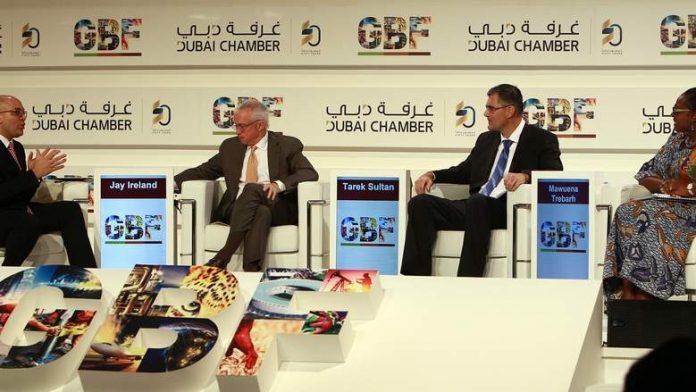The Dubai Chamber of Commerce and Industry is urging its members, and investors in the Arab states of the Persian Gulf in general, to seize opportunities in sub-Saharan Africa, citing co-investment with private equity funds, the purchase of private equity businesses, and direct buyouts or minority share acquisition among the best ways to do so.
In a study produced in collaboration with The Economist Intelligence Unit, the Dubai Chamber not only analyzes current Gulf investment into Africa, opportunities available to investors, and the investment vehicles they can use to enter African markets, but it also sheds light on the continent’s most promising non-commodity sectors.
The study, titled “Beyond Commodities: Gulf Investors and the New Africa,” meticulously describes the factors that make increased Gulf investment in sub-Saharan Africa timely and prudent. These factors include favorable demographic trends, growing consumer markets, economic stability, an improving business environment, a resilience that has allowed the region to withstand global recession and the current commodity price slump, and the planned Tripartite Free Trade Area comprising 27 countries in Eastern and Southern Africa, stretching from Egypt to South Africa.
“Most studies and global indicators point towards a future that is very bright in Sub-Saharan Africa, and so we’re putting our trust in these markets that we think will drive the engine of growth in the region, ensuring that Dubai Chamber is, once again, at the forefront of the investment community and committed to ensuring that all our capabilities are being used to reinforce the competitive nature of the private sector in Dubai,” Hamad Buamim, chamber president and CEO, said at a press conference on Nov. 18 to mark the launch of the study.
The press conference coincided with the conclusion of the Third African Global Business Forum, hosted in Dubai over two days by Dubai Chamber. Buamim said this year’s forum aimed specifically at encouraging Gulf investors to expand beyond North Africa, which currently receives the bulk of Gulf investment in Africa.
Here are the study’s key opportunity highlights:
General. Gulf investors are protected in parts of the continent through multilateral investment treaties. Mauritania, Somalia, Djibouti and Comoros are covered by the Arab League’s investment treaty, while 21 countries—from Senegal to Mozambique—are members of the Organization of Islamic Cooperation, which has its own internal investment treaty.
Regional. East Africa is the most appealing region for non-commodity investment from the Gulf, key sectors being retail and hypermarkets, automotives, commercial banking and tourism. Manufacturing in Ethiopia; leisure, retail and tourism in Mozambique and Kenya; and education in Uganda are also popular with Gulf investors.
Data Services. Much of Africa still lags behind in terms of the coverage and speed of broadband access, the key enabler for ecommerce, with data costs proving to be particularly exorbitant, the study says. However, as smartphones become more ubiquitous, and data services improve, there will be more opportunities for Gulf investors to transform the digital sectors. Gulf investors could provide seed capital to African start-ups, such as those emerging around incubators. There are also potential opportunities to invest in more established companies involved in building the infrastructure of the Internet across Africa, which need capital to scale up rapidly in response to growing demand for data.
Financial Services. With inadequate access to financial services, including banking and insurance, longstanding in Africa, Qatar National Bank, the Gulf’s largest and most widely spread bank, and National Bank of Abu Dhabi, which has positioned itself as a central location on a global “West-East Corridor” of rapidly-growing economies, have put the continent at the heart of their expansion plans. A physical presence is not a required for involvement in major deals, evidenced by a consortium of Gulf banks led by Emirates NBD, that is providing syndicated loans of US$85 million for Stanbic Bank of Uganda, and $125 million for FirstRand in South Africa.
There is likely to be a growing demand for Islamic finance moving forward, given that about 30 percent of the sub-Saharan population are Muslims, have the region’s highest birth rates, and form a sizable minority in key growth countries such as Nigeria and Ethiopia. Kuwait Finance House arranged South Africa’s first sovereign sukuk (Islamic bond), an oversubscribed $500 million issue in 2014, marking only the second time a non-Muslim country had drawn on Islamic financing.
Significant opportunities also exist in insurance and remittances. Outside of South Africa, stock markets are of limited interest to Gulf investors.
Logistics. While travel and tourism suggest lucrative logistics opportunities in the fast-moving consumer goods industry that feeds the tourism sector, Sub-Saharan Africa’s overall poor infrastructure makes logistics expensive in every sector. Still, opportunities in the sector currently are most apparent in Angola, Ghana, Mozambique, Nigeria and Tanzania.
Manufacturing. Although significant barriers, including a reliable energy supply, transport infrastructure, skills, finance, and market access, are investment deterrents, a few countries—Cote d’Ivoire, Kenya, Senegal and South Africa, for example—have more prominent manufacturing sectors. Prominent Gulf investors in this sector are Julphar, Abraaj and Kuwait’s Al Bader Group.
Retail. Malls, hypermarkets, franchise stores and auto dealerships—which are emerging alongside the continent’s growing and increasingly urban population, rising disposable incomes, improving transportation, and a growing appetite for international brands—are an area where Gulf companies have a comparative advantage thanks to a track record in franchising, adapting brands to local tastes and cultures, and their skill in managing the logistics of multi-country distribution.
Social sectors. The growth of the middle class is stimulating demand for private healthcare and education. Dubai’s Aster DM Healthcare is a prominent investor, and GEMS Education already operates schools in Kenya and Uganda, with plans to expand continent-wide.
Travel and tourism. Gulf investors already own some 20 hotels and resorts in Sub-Saharan Africa, and Gulf airlines regularly transport international tourists to the region through direct flights and codeshares. The most developed tourism markets of Ghana, Kenya, South Africa and Tanzania, as well as the emerging markets of Gambia, Mauritius, Mozambique, Rwanda, Seychelles, Zambia and Zanzibar, offer the sector’s best investment opportunities.













